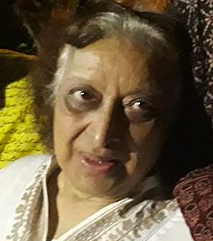Fahmida Riaz (Urdu: فہمیدہ ریاض) (28 July 1946 – 21 November 2018) was a Progressive Urdu writer, poet, human rights activist and feminist of Pakistan.[1] She authored many books, of which some are Godaavari, Khatt-e Marmuz, and Khana e Aab O Gil the first translation in rhyme of the Masnavi of Jalaluddin Rumi from Persian into Urdu. The author of more than 15 books of fiction and poetry, she remained at the center of controversies. When Badan Dareeda, her second collection of verse, appeared, she was accused of using erotic and sensual expressions. The themes prevalent in her verse were, until then, considered taboo for women writers.[2] She also translated the works of Shah Abdul Latif Bhitai and Shaikh Ayaz from Sindhi to Urdu. Fleeing General Zia-ul Haq's religious tyranny, Riaz sought refuge in India and spent seven years there.
The poems from her collection Apna Jurm Sabit Hae reflect her homeland's experience under the dictatorship of General Zia-ul-Haq. By reputation, Riaz stands alongside Nazim Hikmet, Pablo Neruda, Jean-Paul Sartre and Simone de Beauvoir.
Poetry
| Year | Title |
|---|---|
| 1967 | Pathar ki Zaban[5] |
| 1973 | Badan Darida[5] |
| Kya Tum Poora Chand Na Dekho Ge | |
| Mein Mitti Ki Moorat Hoon | |
| Ye Khana-e-Aab-O-Gil[5] | |
| 2011 | Sab Laal-o-Guhar |
Prose
| Year | Title |
|---|---|
| 2008 | Qafile Parindon Ke[5] |
